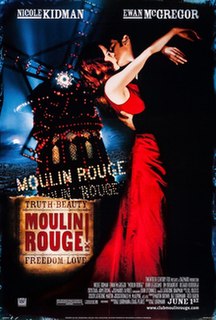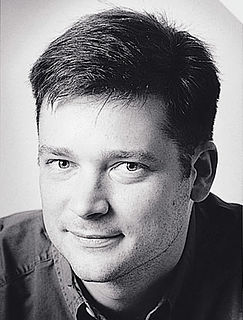
Moulin Rouge! is a 2001 jukebox musical romantic drama film directed, co-produced, and co-written by Baz Luhrmann. It follows a young English poet, Christian, who falls in love with the star of the Moulin Rouge, cabaret actress and courtesan Satine. The film uses the musical setting of the Montmartre Quarter of Paris and is the final part of Luhrmann's "Red Curtain Trilogy," following Strictly Ballroom (1992) and Romeo + Juliet (1996). A co-production of Australia and the United States, it stars Nicole Kidman and Ewan McGregor. John Leguizamo, Jim Broadbent, and Richard Roxburgh feature in supporting roles.

Mark Anthony Luhrmann, known professionally as Baz Luhrmann, is an Australian film director, producer, writer and actor. With projects spanning film, television, opera, theatre, music and recording industries, he is regarded by some as a contemporary example of an auteur for his style and deep involvement in the writing, directing, design, and musical components of all his work. He is the most commercially successful Australian director, with four of his films in the top ten highest worldwide grossing Australian films of all time.

David A. Wagner is a professor of computer science at the University of California, Berkeley and a well-known researcher in cryptography and computer security. He is a member of the Election Assistance Commission's Technical Guidelines Development Committee, tasked with assisting the EAC in drafting the Voluntary Voting System Guidelines. He is also a member of the ACCURATE project.

Kryptos is a sculpture by the American artist Jim Sanborn located on the grounds of the Central Intelligence Agency (CIA) in Langley, Virginia. Since its dedication on November 3, 1990, there has been much speculation about the meaning of the four encrypted messages it bears. Of these four messages, the first three have been solved, while the fourth message remains one of the most famous unsolved codes in the world. The sculpture continues to be of interest to cryptanalysts, both amateur and professional, who are attempting to decipher the fourth passage. The artist has so far given four clues to this passage.
Herbert James Sanborn, Jr. is an American sculptor. He is best known for creating the encrypted Kryptos sculpture at CIA headquarters in Langley, Virginia.
PC World is a global computer magazine published monthly by IDG. Since 2013, it has been an online only publication.
Daniel Tynan is an American journalist, television and radio commentator who specializes in technology, humor, and humorous takes on technology. Former editor in chief of Yahoo Tech, he has also served as an Executive Editor and later contributing editor for PC World, InfoWorld.com, Family Circle and other publications that have gone on to the great magazine Valhalla in the sky.
Edward Michael Scheidt is a retired Chairman of the Central Intelligence Agency (CIA) Cryptographic Center and the designer of the cryptographic systems used in the Kryptos sculpture at CIA Headquarters in Langley, Virginia.
James J. Gillogly is an American computer scientist and cryptographer.

Catherine Martin is an Australian costume designer, production designer and set designer. She won two Academy Awards for Moulin Rouge! in 2002 and another two for The Great Gatsby in 2014. Having won four Oscars, she is the most awarded Australian in Oscar history. She is credited for her several works alongside husband, filmmaker Baz Luhrmann, including Romeo + Juliet (1996), Moulin Rouge! (2001), Australia (2008), The Great Gatsby (2013) and Elvis (2022).
Dual_EC_DRBG is an algorithm that was presented as a cryptographically secure pseudorandom number generator (CSPRNG) using methods in elliptic curve cryptography. Despite wide public criticism, including the public identification of a backdoor, it was for seven years one of four CSPRNGs standardized in NIST SP 800-90A as originally published circa June 2006, until it was withdrawn in 2014.
There are many claims that the Central Intelligence Agency (CIA) has repeatedly intervened in the internal affairs of Iran, from the Mossadegh coup of 1953 to the present time. The CIA is said to have collaborated with the last Shah, Mohammad Reza Pahlavi. Its personnel may have been involved in the Iran-Contra affair of the 1980s. More recently in 2007-8 the CIA were claimed to be supporting the Sunni terrorist group Jundallah against Iran, but these claims were refuted by a later investigation.

Kaspersky Lab is a Russian multinational cybersecurity and anti-virus provider headquartered in Moscow, Russia, and operated by a holding company in the United Kingdom. It was founded in 1997 by Eugene Kaspersky, Natalya Kaspersky, and Alexey De-Monderik; Eugene Kaspersky is currently the CEO. Kaspersky Lab develops and sells antivirus, internet security, password management, endpoint security, and other cybersecurity products and services.
Stuxnet is a malicious computer worm first uncovered in 2010 and thought to have been in development since at least 2005. Stuxnet targets supervisory control and data acquisition (SCADA) systems and is believed to be responsible for causing substantial damage to the nuclear program of Iran. Although neither country has openly admitted responsibility, the worm is widely understood to be a cyberweapon built jointly by the United States and Israel in a collaborative effort known as Operation Olympic Games. The program, started during the Bush administration, was rapidly expanded within the first months of Barack Obama's presidency.

Elonka Dunin is an American video game developer and cryptologist. Dunin worked at Simutronics Corp. in St. Louis, Missouri from 1990–2014, and in 2015 was Senior Producer at Black Gate Games in Nashville, Tennessee. She is Chairperson Emerita and one of the founders of the International Game Developers Association's Online Games group, has contributed or been editor in chief on multiple IGDA State of the Industry white papers, and was one of the Directors of the Global Game Jam from 2011–2014. As of 2020 she works as a management consultant at Accenture.
Flame, also known as Flamer, sKyWIper, and Skywiper, is modular computer malware discovered in 2012 that attacks computers running the Microsoft Windows operating system. The program is used for targeted cyber espionage in Middle Eastern countries.

Cellphone surveillance may involve tracking, bugging, monitoring, eavesdropping, and recording conversations and text messages on mobile phones. It also encompasses the monitoring of people's movements, which can be tracked using mobile phone signals when phones are turned on.

Roger Dingledine is an American computer scientist known for having co-founded the Tor Project. A student of mathematics, computer science, and electrical engineering, Dingledine is also known by the pseudonym arma. As of December 2016, he continues in a leadership role with the Tor Project, as a project Leader, Director, and Research Director.
Yiqun Lisa Yin is a Chinese-American cryptographer and independent security consultant. Yin is known for breaking the SHA-1 cryptographic hash function, for developing the RC6 block cipher, and for her service as editor of the IEEE P1363 project for the standardization of public-key cryptography.

Vanessa Joy Teague is an Australian cryptographer, known for her work on secret sharing, cryptographic protocols, and the security of electronic voting. She was an associate professor of computing and information systems at the University of Melbourne, until resigning in February 2020 and is an Adjunct Associate Professor at the ANU College of Engineering and Computer Science. She is a member of the Board of Advisors of the Verified Voting Foundation.









